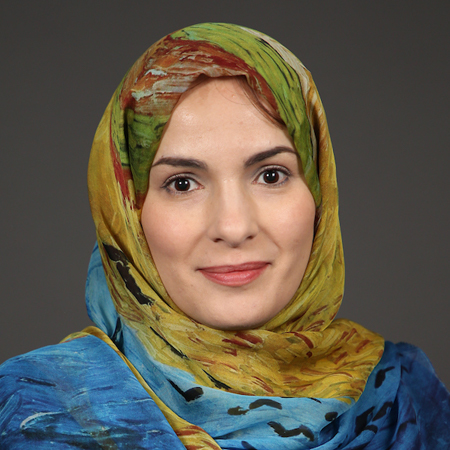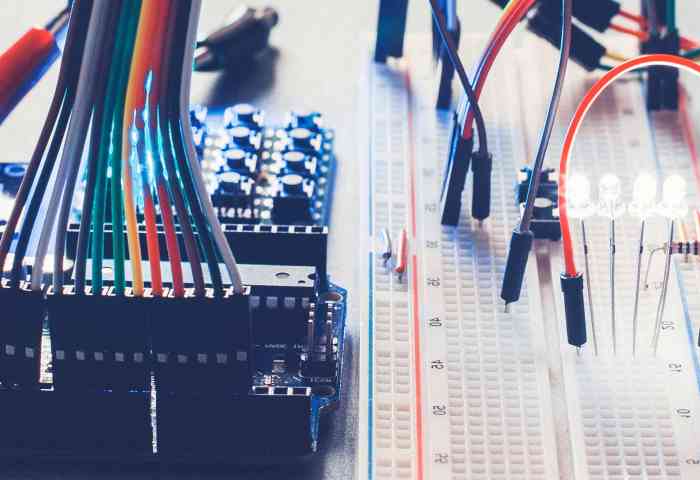Get started with Missouri S&T
Apply hereMaster of science
Technology’s pace shapes all aspects of society — from the design of products, electronics and computer networks to energy sources and telecommunications. These innovations directly influence the field of electrical engineering, requiring professionals to update their skills, expand their knowledge base and incorporate the latest capabilities into concepts and projects.
Missouri University of Science and Technology’s (Missouri S&T) online master of science in electrical engineering serves two purposes for professionals. One, course work introduces the latest developments in circuits, semiconductors, energy systems, signal processing, control systems and nanotechnology and presents the opportunity to develop a specialization. Two, a customized program structure allows mid-career engineers to chart their path forward — including toward leadership, a more advanced role or research.
In line with these possibilities, Missouri S&T offers thesis and non-thesis formats for the online master’s in electrical engineering. Students may apply to the program directly for admission or explore a specialty through a graduate certificate program before transferring their credits toward a master’s. Certificates paving the way toward the online master’s in electrical engineering include advanced control systems, automation engineering and PLC, electric machine and drives and electrical power systems engineering.
Quick facts
Official name
Master of science in electrical engineeringCampus
Program type
Master's degreeAcademic home
College of Engineering and Computing | Department of Electrical and Computer EngineeringDelivery mode
100% onlineAccreditation
Higher Learning CommissionCredit hours
30Estimated cost
$36,000.00Military credit hours
30Military estimated cost
$23,850.00*This cost is for illustrative purposes only. Your hours and costs will differ, depending on your transfer hours, your course choices and your academic progress. See more about tuition and financial aid.
About the online master’s in electrical engineering
The next stage of your career requires a strategic, authoritative perspective. The online master’s in electrical engineering emphasizes this factor through three channels: honing your knowledge of a subdiscipline, developing a problem-solving mindset and pulling from these skills to make decisions and take charge of projects as a leader.
With these objectives in mind, all candidates acquire a primary and a secondary specialization in a combination of the following areas:
- Circuits, an electrical engineering subdiscipline encompassing network analysis and synthesis, computer-aided circuit design, communications circuits and linear and nonlinear electronic circuits
- Communications and signal processing, with subjects covering signal design, coding, modulation, detection and filtering for both analog and digital systems
- Computer engineering, in the context of electrical engineering with topics covering system design, computer networks and architecture
- Control systems technology, with emphasis given to linear and nonlinear systems, digital control, process control system simulation, optimal control and estimation, robust control, neural networks and fuzzy logic-based control systems and control of smart structures
- Electromagnetics, such as the generation, propagation and detection of electromagnetic fields and waves and fiber optics-related topics like optical processing, optical computing and smart sensing
- Electronics, specifically circuits and networks containing active devices
- Power and energy, including application of computer methods to power system analysis and control, power system relaying and protection, power quality load management, finite inertia power systems and electromechanical energy conversion devices, such as rotating machinery, power electronic converters and electric drive systems
As you look toward the next stage of your career, this flexible program equips you to recognize and conceive solutions to electrical engineering-related challenges across multiple industries. You’ll:
- Develop a specialization while starting to identify your leadership style
- Be prepared to meet project demands for advanced technology integration and renewable energy usage
- Broaden your foundation in engineering, technology, science and mathematics
- Get inspired by faculty members whose contributions influence the field of electrical engineering
- Position yourself to shift to a role in leadership or research and development
- Explore real-world applications of current technological, energy and design innovations

Career prospects
Missouri S&T's online electrical engineering graduate program prepares you to lead projects and devise solutions incorporating the latest advancements to address modern technology’s most pressing concerns. With steady demand for electrical engineers predicted over the next decade, opportunities exist in:
- Computer and system design
- Electrics
- Energy and power
- Product development
- Quality control
- Research and development
- Robotics
- Telecommunications
Program structure
The online master’s in electrical engineering involves 30 credit hours for both thesis and non-thesis tracks. All candidates select a primary specialization requiring at least 12 credit hours and a secondary specialization involving up to nine credit hours. As you start the program, you’ll develop a formal plan of study with your department advisor, selecting courses based on your interests, strengths and fulfilling degree requirements.
Thesis: Candidates complete a minimum of 21 hours of course work and dedicate a minimum of six credit hours toward high-quality, original research resulting in a work worthy of publication. You’ll have the opportunity to learn from the Department of Electrical and Computer Engineering’s esteemed professors and utilize Missouri S&T’s centers, laboratories and institutes to gather data and integrate electrical engineering with other scientific, mathematical and technology-related disciplines.
Non-thesis: Candidates take fully online courses across engineering, mathematics and science subjects to focus on a primary and a secondary specialization in line with their interests, strengths and career goals.
Delivery of this program is 100% online: no campus visits are required. Courses are semester-based. Students typically take one or two classes each semester and finish in two to three years.
Review all courses and requirements for the online master’s in electrical engineering.
Delivery
100% onlineCalendar system
SemesterTypical program length
3 yearsTypical course load
1-2 classes per semesterPathway to a master's degree
Missouri S&T structures distance learning programs around the needs of working professionals. This includes flexible formats and 100% online learning, as well as our pathway to a master’s option.
For candidates who don’t have time to take the GRE, you’ll begin in a related graduate certificate program. In the case of the online master’s in electrical engineering, you’ll complete the certificate, apply to the master’s program and transfer your credits to continue with this course of study without submitting GRE scores.
For the online master’s in electrical engineering, pathway certificate programs include:
- Advanced control systems
- Automation engineering and PLC
- Electric machine and drives
- Electrical power systems engineering
Please note that the completion of a graduate certificate does not automatically guarantee admission to a corresponding graduate degree program. If interested in a master’s degree program, you must apply after earning your graduate certificate. A minimum 3.0 GPA for each course is required to continue with the master’s degree sequence.
If you are applying to a PhD program, you are still required to submit GRE scores.
Accreditation
Missouri University of Science and Technology is accredited by the Higher Learning Commission, one of six regional institutional accreditors in the United States.
Faculty spotlight

Areas of interest: Cyber-physical systems, critical infrastructure protection, simulation and analytical modeling of complex networked systems, system and information assurance, networked systems for remote structural health monitoring.
